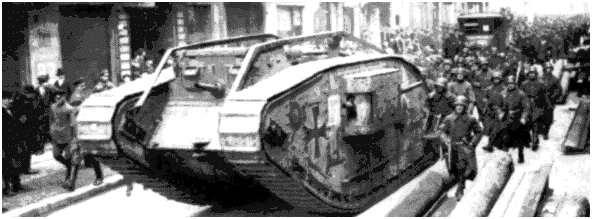Of
Tanks

I found it hard to believe that my life had once been made up of these dusty relics. I had lived without sunlight, without desire --- in the twilight of books. In search of a phantom country, a mirage of a France of yesteryear, peopled with ghosts.For at last I was coming back to life. Living in the happy simplicity of orderly actions: shooting, marching in file, eating millet kasha from aluminum mess tins. Letting oneself be carried along in a collective movement directed by others, by those who knew the supreme objective, who generously relieved us of all the burden of responsibility, making us light, transparent, clear. The objective was simple and unequivocal too: to defend the fatherland.
I could not wait to lose myself in this monumental goal, to dissolve into the marvelously irresponsible mass of my comrades. I hurled practice grenades; I shot; I pitched a tent. Happy. Blissful. Healthy. And that adolescent in an old house at the edge of the steppe, who had spent entire days meditating on the life and death of three women seen in a pile of old newspapers, seemed increasingly unreal. If I had been introduced to this dreamer I would doubtless have not recognized him. I would not have recognized myself.
The next day the instructor took us to watch the arrival of a column of tanks. What we made out first was a grey cloud growing larger on the horizon. Then a mighty vibration spread through the soles of our shoes. The earth shook. And the cloud, turning yellow, rose as high as the sun and eclipsed it. All sounds disappeared, shrouded by the metallic din of the caterpillar tracks. The first gun thrust through the wall of dust, the commander's tank loomed, then the second, the third. And, before stopping, the tanks described a tight arc, so as to line up side by side. Then their tracks clattered even more furiously, tearing up the grass in long slices.
Hypnotized by the power of the empire, I had a sudden vision of the terrestrial globe and how these tanks --- our tanks! --- could strip it entirely bare. A brief command would have sufficed. I took a pride in this, such as I had never felt before.
And the soldiers who emerged from the turrets fascinated me with their serene vitality. They were all alike, carved from the same firm and healthy material. I guessed that they would have been invulnerable to the morbid thoughts that had tortured me during the winter. No, all that mental sludge would not have remained for a single second in the clear stream of their thinking, simple and direct, like the orders they executed. I was terribly jealous of their life. It was exposed there, under the sun, without a spot of shadow. I had only one wish now: to be able one day to emerge from the narrow turret of a tank, leap down onto its tracks, then onto the soft earth, and to walk with pleasantly weary steps toward the promise of a woman.
This life, actually a very Soviet life on whose margins I had always lived, now exalted me. To blend into its easygoing and collectivist routine suddenly seemed to me like a brilliant solution. To live the life of everybody else! To drive a tank; then, when demobilized, to pour molten steel amid the machines in a great factory beside the Volga; to go to the stadium every Saturday to watch a football match. But above all to know that this succession of days, tranquil and predictable, was crowned by a grand messianic project --- the communism that, one day, would make us all perpetually happy, clear as crystal in our thoughts, strictly equal.
It was then that, almost grazing the forest treetops, the fighter aircraft hurtled over our heads. Flying in groups of three, they caused the exploded sky to fall in about our ears. They surged past, wave after wave, ripping the air, their decibels cutting into my brain.
Later, in the silence of evening, I spent a long time gazing at the empty plain, with the dark streaks of torn-up grass here and there. I said to myself that once upon a time there had been a child who had imagined a fabulous city rising above that misty horizon....That child was no more. I was cured.
--- From Dreams of My Russian Summers
Andrei Makine
La Testament Francais
Translated by Geoffrey Strachan
©1998, Simon and Schuster§ § §
§ § §